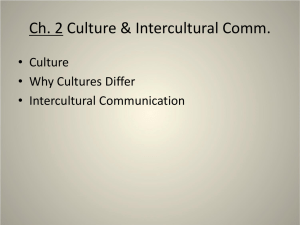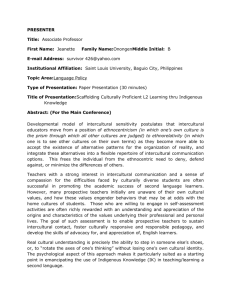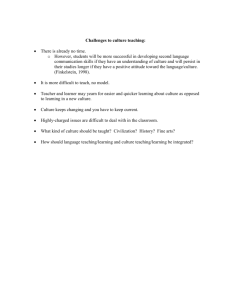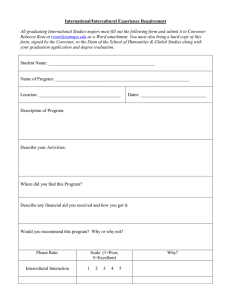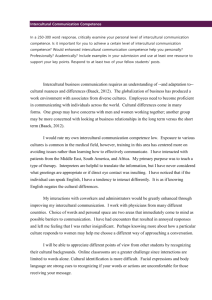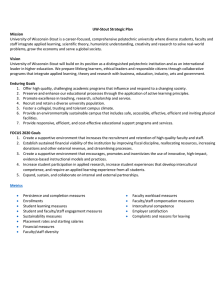I K C VALUE
advertisement
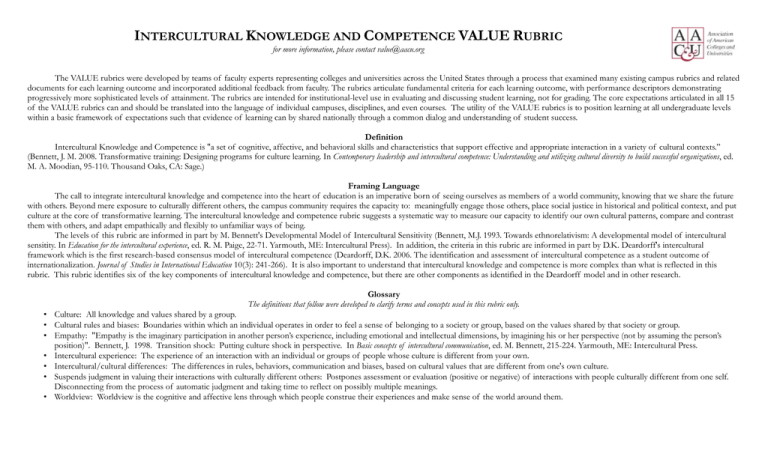
INTERCULTURAL KNOWLEDGE AND COMPETENCE VALUE RUBRIC for more information, please contact value@aacu.org The VALUE rubrics were developed by teams of faculty experts representing colleges and universities across the United States through a process that examined many existing campus rubrics and related documents for each learning outcome and incorporated additional feedback from faculty. The rubrics articulate fundamental criteria for each learning outcome, with performance descriptors demonstrating progressively more sophisticated levels of attainment. The rubrics are intended for institutional-level use in evaluating and discussing student learning, not for grading. The core expectations articulated in all 15 of the VALUE rubrics can and should be translated into the language of individual campuses, disciplines, and even courses. The utility of the VALUE rubrics is to position learning at all undergraduate levels within a basic framework of expectations such that evidence of learning can by shared nationally through a common dialog and understanding of student success. Definition Intercultural Knowledge and Competence is "a set of cognitive, affective, and behavioral skills and characteristics that support effective and appropriate interaction in a variety of cultural contexts.” (Bennett, J. M. 2008. Transformative training: Designing programs for culture learning. In Contemporary leadership and intercultural competence: Understanding and utilizing cultural diversity to build successful organizations, ed. M. A. Moodian, 95-110. Thousand Oaks, CA: Sage.) Framing Language The call to integrate intercultural knowledge and competence into the heart of education is an imperative born of seeing ourselves as members of a world community, knowing that we share the future with others. Beyond mere exposure to culturally different others, the campus community requires the capacity to: meaningfully engage those others, place social justice in historical and political context, and put culture at the core of transformative learning. The intercultural knowledge and competence rubric suggests a systematic way to measure our capacity to identify our own cultural patterns, compare and contrast them with others, and adapt empathically and flexibly to unfamiliar ways of being. The levels of this rubric are informed in part by M. Bennett's Developmental Model of Intercultural Sensitivity (Bennett, M.J. 1993. Towards ethnorelativism: A developmental model of intercultural sensitity. In Education for the intercultural experience, ed. R. M. Paige, 22-71. Yarmouth, ME: Intercultural Press). In addition, the criteria in this rubric are informed in part by D.K. Deardorff's intercultural framework which is the first research-based consensus model of intercultural competence (Deardorff, D.K. 2006. The identification and assessment of intercultural competence as a student outcome of internationalization. Journal of Studies in International Education 10(3): 241-266). It is also important to understand that intercultural knowledge and competence is more complex than what is reflected in this rubric. This rubric identifies six of the key components of intercultural knowledge and competence, but there are other components as identified in the Deardorff model and in other research. Glossary The definitions that follow were developed to clarify terms and concepts used in this rubric only. • Culture: All knowledge and values shared by a group. • Cultural rules and biases: Boundaries within which an individual operates in order to feel a sense of belonging to a society or group, based on the values shared by that society or group. • Empathy: "Empathy is the imaginary participation in another person’s experience, including emotional and intellectual dimensions, by imagining his or her perspective (not by assuming the person’s position)". Bennett, J. 1998. Transition shock: Putting culture shock in perspective. In Basic concepts of intercultural communication, ed. M. Bennett, 215-224. Yarmouth, ME: Intercultural Press. • Intercultural experience: The experience of an interaction with an individual or groups of people whose culture is different from your own. • Intercultural/cultural differences: The differences in rules, behaviors, communication and biases, based on cultural values that are different from one's own culture. • Suspends judgment in valuing their interactions with culturally different others: Postpones assessment or evaluation (positive or negative) of interactions with people culturally different from one self. Disconnecting from the process of automatic judgment and taking time to reflect on possibly multiple meanings. • Worldview: Worldview is the cognitive and affective lens through which people construe their experiences and make sense of the world around them. INTERCULTURAL KNOWLEDGE AND COMPETENCE VALUE RUBRIC for more information, please contact value@aacu.org Definition Intercultural Knowledge and Competence is "a set of cognitive, affective, and behavioral skills and characteristics that support effective and appropriate interaction in a variety of cultural contexts.” (Bennett, J. M. 2008. Transformative training: Designing programs for culture learning. In Contemporary leadership and intercultural competence: Understanding and utilizing cultural diversity to build successful organizations, ed. M. A. Moodian, 95-110. Thousand Oaks, CA: Sage.) Evaluators are encouraged to assign a zero to any work sample or collection of work that does not meet benchmark (cell one) level performance. Capstone 4 3 Milestones 2 Benchmark 1 Knowledge Cultural self- awareness Articulates insights into own cultural rules and biases (e.g. seeking complexity; aware of how her/his experiences have shaped these rules, and how to recognize and respond to cultural biases, resulting in a shift in self-description.) Recognizes new perspectives about own cultural rules and biases (e.g. not looking for sameness; comfortable with the complexities that new perspectives offer.) Identifies own cultural rules and biases (e.g. with a strong preference for those rules shared with own cultural group and seeks the same in others.) Shows minimal awareness of own cultural rules and biases (even those shared with own cultural group(s)) (e.g. uncomfortable with identifying possible cultural differences with others.) Knowledge Knowledge of cultural worldview frameworks Demonstrates sophisticated understanding of the complexity of elements important to members of another culture in relation to its history, values, politics, communication styles, economy, or beliefs and practices. Demonstrates adequate understanding of the complexity of elements important to members of another culture in relation to its history, values, politics, communication styles, economy, or beliefs and practices. Demonstrates partial understanding of the complexity of elements important to members of another culture in relation to its history, values, politics, communication styles, economy, or beliefs and practices. Demonstrates surface understanding of the complexity of elements important to members of another culture in relation to its history, values, politics, communication styles, economy, or beliefs and practices. Skills Empathy Interprets intercultural experience from the perspectives of own and more than one worldview and demonstrates ability to act in a supportive manner that recognizes the feelings of another cultural group. Recognizes intellectual and emotional dimensions of more than one worldview and sometimes uses more than one worldview in interactions. Identifies components of other cultural Views the experience of others but does so through perspectives but responds in all situations with own own cultural worldview. worldview. Skills Verbal and nonverbal communication Articulates a complex understanding of cultural differences in verbal and nonverbal communication (e.g., demonstrates understanding of the degree to which people use physical contact while communicating in different cultures or use direct/indirect and explicit/implicit meanings) and is able to skillfully negotiate a shared understanding based on those differences. Recognizes and participates in cultural differences in verbal and nonverbal communication and begins to negotiate a shared understanding based on those differences. Identifies some cultural differences in verbal and nonverbal communication and is aware that misunderstandings can occur based on those differences but is still unable to negotiate a shared understanding. Has a minimal level of understanding of cultural differences in verbal and nonverbal communication; is unable to negotiate a shared understanding. Attitudes Curiosity Asks complex questions about other cultures, seeks Asks deeper questions about other cultures and out and articulates answers to these questions that seeks out answers to these questions. reflect multiple cultural perspectives. Asks simple or surface questions about other cultures. States minimal interest in learning more about other cultures. Attitudes Openness Initiates and develops interactions with culturally different others. Suspends judgment in valuing her/his interactions with culturally different others. Expresses openness to most, if not all, interactions with culturally different others. Has difficulty suspending any judgment in her/his interactions with culturally different others, and is aware of own judgment and expresses a willingness to change. Receptive to interacting with culturally different others. Has difficulty suspending any judgment in her/his interactions with culturally different others, but is unaware of own judgment. Begins to initiate and develop interactions with culturally different others. Begins to suspend judgment in valuing her/his interactions with culturally different others.
